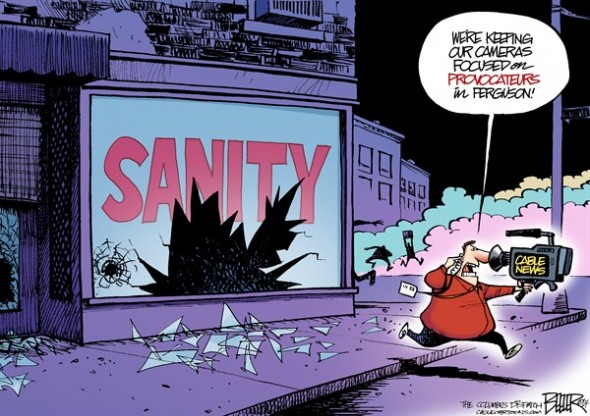I don’t know very much about race relations in America. I want that to be the first thing I say on the topic. It’s not that I don’t want to know, or that I’m necessarily detached from it. It’s just that I’m not in a position to truly understand the extremity of its related issues. Most of my family members immigrated to the U.S. after slavery had been banned, and none of them ended up living the south anyway. But I’m a part of the topic because I am an American.
Race relations are incredibly complicated. They make people very emotional—for good reason. They have a gruesome history that cuts wounds still today.
Racism is repulsive, but name-calling is deplorable too.

“The New York Times” and CBS News conducted a poll in the aftermath of the shooting in Ferguson, Mo. To sum it up, it supports my earlier statement that race relations are complicated—Americans are generally split on the issue, and blacks think the situation is worse than whites do. For example, 57% of blacks responded that the shooting of Michael Brown by the police in Ferguson was not justified, while only 18% of whites held the same opinion.
I’m becoming more and more convinced that people are becoming less and less concerned about race in America—that is, treating people differently because of the color of their skin. It’s not gone, but those of less common racial and ethnic backgrounds have made tremendous strides in the last ten years alone.
But even as a member of the media, I’m a critic of my industry’s need to pit people against each other in the wake of a tragedy that sparks racial tensions.
After Michael Brown was shot in Missouri, cable televisions became a roundabout of speculation and dramatization. There became a need amongst publishers to rally around heroes and victims. Some news organizations branded Darren Wilson as a hero fighting for his life, and some portrayed Brown as an absolutely perfect child who was killed because he was black.
Both those depictions are rooted in misrepresentations. Both Wilson and Brown were people, but what so many media outlets did was to turn them into characters in order to advance a plot. The same thing happened in the Trayvon Martin shooting, and has happened dozens of times before that. It seems as if race relations in America are most hampered now by trivial storylines.
Edited by Evaldas Labanauskas

Dear Andrew,
You make a very valid point, sensationalism exists in journalism, there is no denying it. Unfortunately in the case of cases such as Michael Brown, people live for the drama and the pinpointing of a victim and a villain. Personally I hope this changes however it is so ingrained in us as individuals to seek out this information, that the media feeds off of this to please their audiences.
Nice post!
Sepeedeh
Hi Andrew!
I really enjoyed your post! Media in general wants to confine stories into good vs. evil conventions. This really hurts the accuracy and complexity of reporting because real life rarely mirrors fairy tale simplicity. International coverage of other stories, such as the Syrian conflict, are often flat and short-lived because of this issue.